I first got into my favorite band, Marilyn Manson, back in 2001, when “The Nobodies” was released as a single. I soon bought the album it came from, Holy Wood, and my life was changed. Over the following six months I bought all of Marilyn Manson’s previous albums, in chronological order, ending with Mechanical Animals. I suspected that it was going to be my favorite, since I had already seen music videos and heard live versions of several of its songs. Still, the album exceeded my expectations, and the outstanding title track, “Mechanical Animals,” somehow surpassed those I’d already heard.
I’ve always felt like the albums comprising Marilyn Manson’s famous triptych each connect with a different aspect of one’s character. Antichrist Superstar, with its innovative and experimental structure, themes, and songwriting, never fails to inspire my creativity. Holy Wood brings out my intellectual curiosity, driving me to look deeper into the countless references contained within its songs, and to see the world in different ways. Mechanical Animals somehow syncs up with my emotions, providing solace, understanding, and healing. As important as the other two albums are to me, Mechanical Animals connects with the very core of who I am, more than any other album ever has (and, I suspect, ever will).
It was February 2002 when I bought Mechanical Animals on CD, along with an Incubus album that I’ve forgotten the title of. I listened to the Incubus album a couple of times. Then I listened to Mechanical Animals, and the unfortunate Incubus album was discarded, destined to barely be given another thought, as I went on to listen to Mechanical Animals constantly for at least a month, and regularly ever since. I listen to it for enjoyment, to marvel at the endless layers in both the music and lyrics, as a lullaby, and in my darkest moments, knowing it’s the one thing that can bring me out of them.
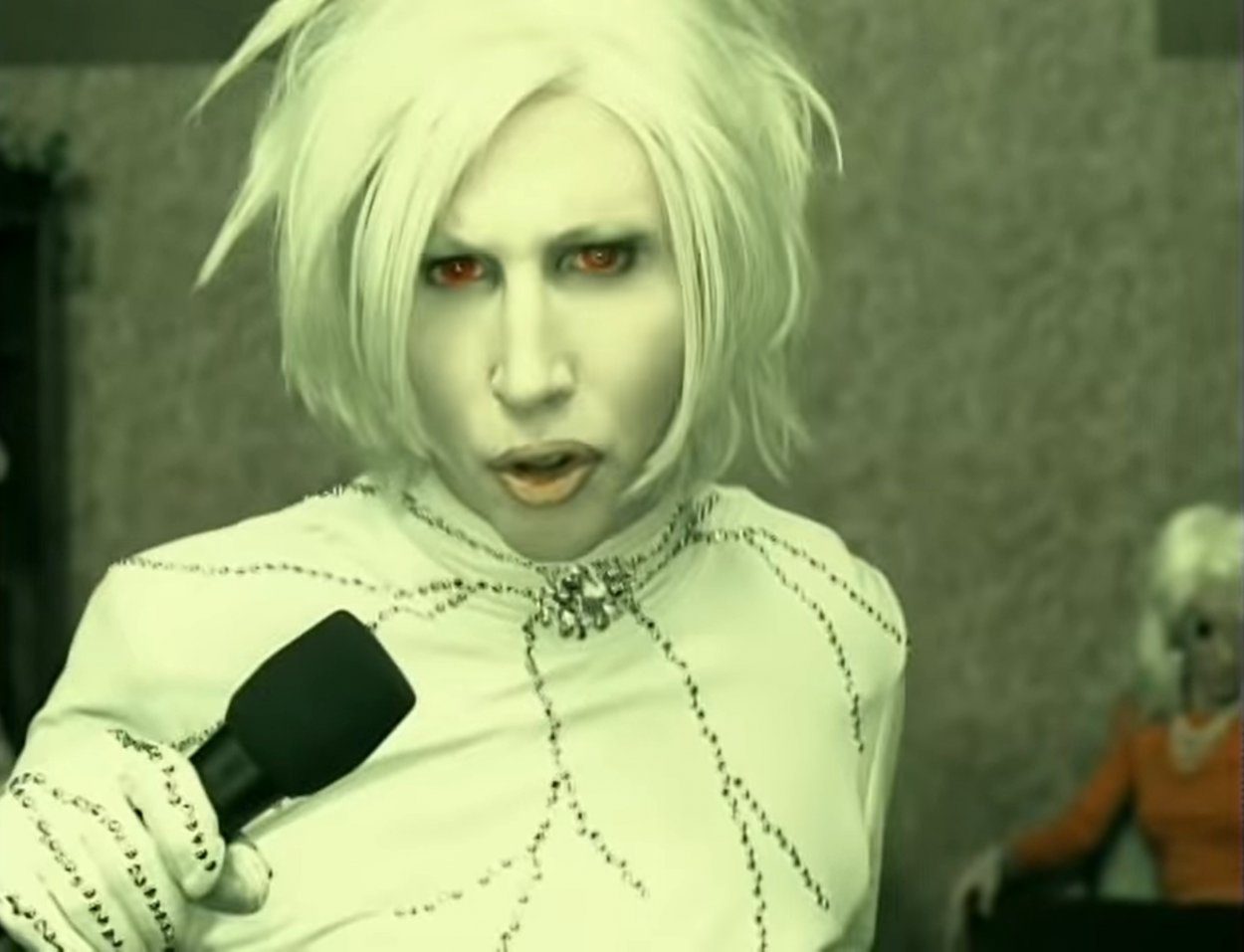
I used to think the album was magic somehow, because no matter what I was upset about, the lyrics seemed to change to describe that exact situation. While Marilyn Manson’s triptych does contain a certain mysticism, I eventually realized that the problems in my life could almost all be traced back to the same origins—social anxiety disorder, feeling overlooked, and worrying what people thought about me—and that the central themes of Mechanical Animals reflected those central themes in my life. The lyrics are nuanced and flexible enough to mold to different situations but still retain their insights. That’s why the album always resonates so strongly with me, helping me to work through my problems, no matter what it is that I’m dealing with at that particular moment.
Each album in Marilyn Manson’s triptych is a concept album. However, I tend to think of each one more as containing certain themes and motifs throughout, with just a vague sense of a story. Broadly speaking, Mechanical Animals is about an alien becoming a rock star, and struggling to deal with fame. Outer space, drugs, and the digital or mechanical world pop up again and again in the lyrics, used effectively as metaphors to elaborate on the album’s themes of isolation, emptiness, and conformity.
These days, of course, most people will just stream or download the songs, but I was always entranced by the album’s artwork. The CD came in a blue case, which is fairly unique to start with—I’ve personally never seen another album that came in a colored case rather than a plain clear one. I always thought it made sense since, in my eyes, this was clearly the most special album in existence. Aside from this bright blue, the album’s artwork seems to be defined by the prominence of grey and white—colors which are also referenced in a couple of the songs’ lyrics, and which reflect the sense of loneliness that Mechanical Animals explores, as well as bringing to mind both the emptiness of outer space, and the aesthetics of metallic, mechanical things.
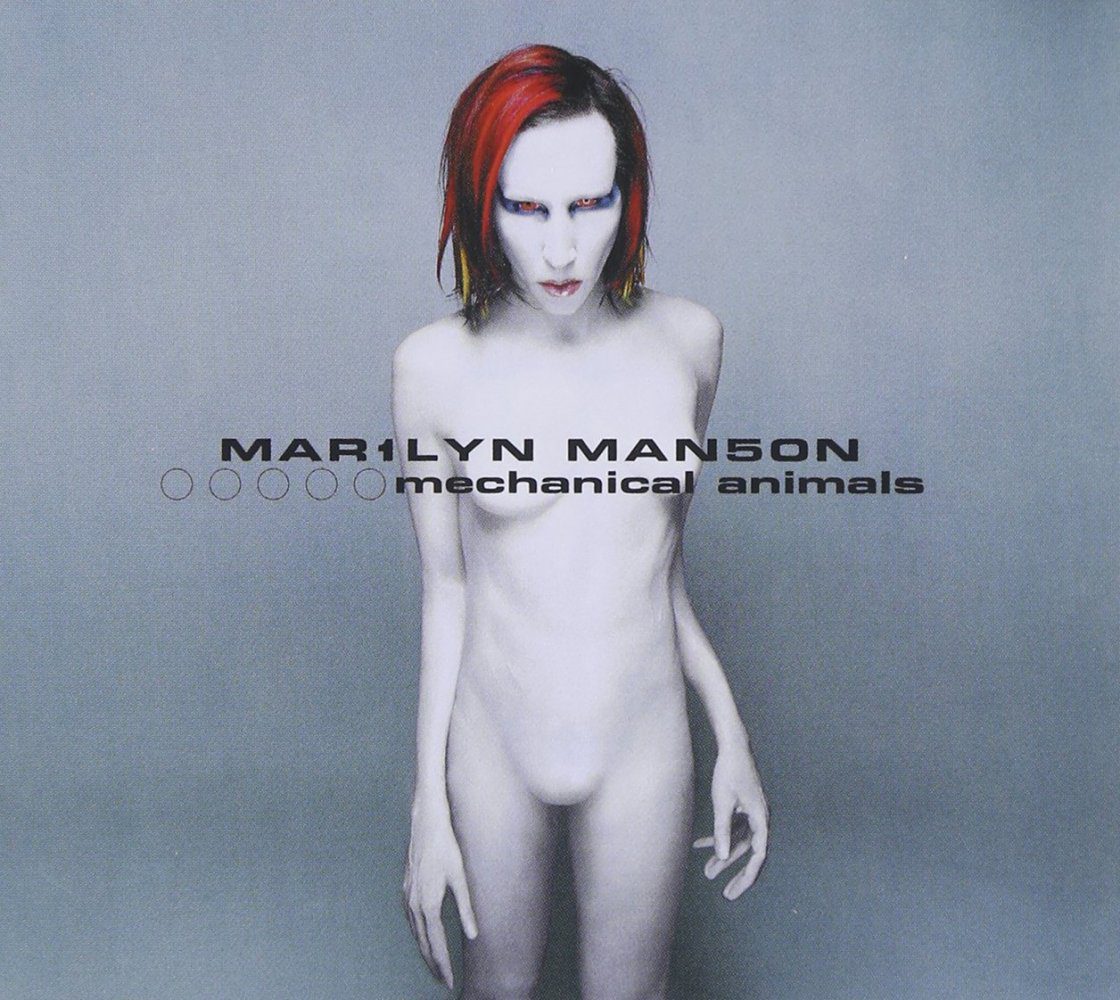
While Marilyn Manson’s music can generally be classed as metal or industrial, Mechanical Animals adds a strong electronic element. This electronic element ties in nicely with the digital and mechanical motifs in the lyrics. The overall sound that the band created for the album is utterly beautiful and complex. The flowing notes and the heavier beats conjure images of alien landscapes—unlike anything you’ve ever experienced, but absolutely breathtaking, and also fitting in with the lyrics about aliens and outer space.
Mechanical Animals’ sound is incredibly distinctive. It’s not present on anything I’ve ever heard other than this album, whether by Marilyn Manson or anyone else, but it is clearly present on every track here. It gives the album a fantastic sense of cohesion and uniqueness. You hear it and you know that this is truly something special. Beyond this, the album is so intricately crafted that I notice new melodies every time I listen to it, even now. I close my eyes and follow some instrument hidden in the depths of a song, and I discover another layer. Just like the magical-seeming lyrics, the music always has more to give, morphing into something slightly different with every listen.
Even the track order seems to have a huge significance. While I will happily skip around the songs much of the time, when I’m at my lowest points, I listen to the album in its entirety. Doing this has pulled me out of despair many times, and the track order is an important part of the process.
01. Great Big White World
The opening track, “Great Big White World,” is the perfect starting point. It begins by elaborating on a concept that was touched upon at the end of Manson’s previous album, Antichrist Superstar, which featured the repeating phrase, “When all of your wishes are granted, many of your dreams will be destroyed.” Mechanical Animals opens with the following lyrics:
In space the stars are no nearer
Just glitters like a morgue
And I dreamed I was a spaceman
Burned like a moth in a flame
And our world was so f*cking gone
When you go through life feeling isolated, unaccepted, or otherwise unsatisfied, it’s easy to put all your faith into some future change. You convince yourself that when that happens (represented in the lyrics by going into space), everything will be better (you will reach the stars). When you get the job you want, find a romantic relationship, move to a new city, start a hobby and meet like-minded people—whatever the specifics, this new phase of life will be the key to finally fitting in and being happy.
When you get there and discover that’s not the case (the stars are no nearer), it can be crushing. It’s heartbreaking to still feel like an outsider, even amongst people you thought would understand you, or to realize that your dream job isn’t perfect after all. That’s often how I feel when I listen to Mechanical Animals—disillusioned with whatever I thought would improve my life.

The lyrics might also describe religion, rock stars, or any kind of hero that you hope will save you, and the hopelessness you feel when you realize they can’t—when they only end up disappointing you. There’s an awful kind of mood that I used to get into, when even the things I loved couldn’t make me feel better. I never found anything that could quickly or effectively pull me out of that mood, until I heard “Great Big White World.” Further lyrics describe the feeling perfectly:
It’s a great big white world
And we are drained of our colors
We used to love ourselves
We used to love one another
When you’re feeling alone, depressed, and disillusioned, you lose your ability to perceive anything positive. The things that you normally love don’t look the same—you can no longer see all the colors that make them wonderful. You start to resent yourself, and you feel disconnected from everyone. You’re aware of a time when things weren’t like this (when you loved yourself, and you felt loved by others), but you don’t know how to get back there.
All my stitches itch
My prescription’s low
You’re falling apart, and the things that are supposed to keep you together aren’t working. Somehow, all of this is in the music as well. The frustration, the pain, the desperation—you can hear it, but it’s simultaneously been twisted into something wonderful. There’s one part in particular, at around 03:51, that I can physically feel in my chest. It’s like the emotion in the music becomes something tangible, I can feel myself pushing up against it, then the song turns back into this magnificent creation and there’s this incredible catharsis.
This song is really the only thing I can connect with when I’m in that state, and listening to it is the only way I can move past it. That’s why it has to be the first song on the album. It gets me to the point where I can connect with the rest of the songs.
02. The Dope Show
The next song is “The Dope Show.” Whether you’re dealing with unrequited love, a falling out with someone you’re close to, or your hard work being unappreciated, this song encapsulates what it feels like to be rejected or misunderstood by those you want to be accepted by.
They love you when you’re on all the covers
When you’re not, then they love another
They may be fairly simple lyrics, but they demonstrate the fact that sometimes other people make you feel like who you are isn’t good enough on its own. They put pressure on you to live up to their standards. They don’t understand or care that you can’t. Another cathartic song, “The Dope Show” is an outlet for the pain that comes from being dismissed or hurt by the people you care about.
As a note, throughout this album, drugs are equated with TV, movies, and other forms of escapism. In “The Dope Show,” this is suggested by the line, “The drugs, they say, are made in California,” which can be taken as a reference to Hollywood, the world’s most famous source of entertainment.
03. Mechanical Animals
The next song is “Mechanical Animals”—in my opinion the best song on the album, and quite possibly the best song of all time.
We were neurophobic and perfect
The day that we lost our souls
Maybe we weren’t so human
But if we cry, we will rust
Manson often coins portmanteaus in his lyrics, and since “neuro” relates to nerves and the brain, while “phobic” means someone with a specific fear, it can be inferred that “neurophobic” here means someone who is afraid of thinking or feeling. The verse argues that such people may appear to be perfect, but that they are akin to robots (or “mechanical animals”)—soulless and inhuman. The lyrics remind us that being flawed, crying, experiencing negative emotions, and thinking profoundly are the very things that make us human. These things give us empathy and perspective, and allow us to connect with others through art and deep conversation.
Any of us who have struggled with mental illness, or who have ever been labelled “too sensitive,” can certainly relate to the pressure to be perfect—to be normal and successful. It’s a pressure that we put on ourselves as much as others put it on us. “Mechanical Animals” assures us that it’s okay to struggle.
I was a hand grenade
That never stopped exploding
You were automatic
And as hollow as the ‘o’ in God
As a “hand grenade,” you might hate yourself for always exploding—i.e., always getting upset, overthinking things, or messing up—but these are the things make you human, and that help you to relate to others. Anyone perfect, or “automatic,” likely doesn’t understand these struggles, or those who face them. They are hollow—afraid to think or feel too deeply—as illustrated by the ingenious wordplay that compares them to the hollow shape of the written letter “o.” This is taken even further as it’s specified that the “o” is the one in the word “God,” emphasizing that perfection is incompatible with humanity, not something to aspire to, while simultaneously implying that God and religion are themselves hollow and meaningless. Organized religions and their representatives then are just like these mechanical animals, ascribing perfection to themselves without any humanity, while denying real flaws, feelings, and thoughts.
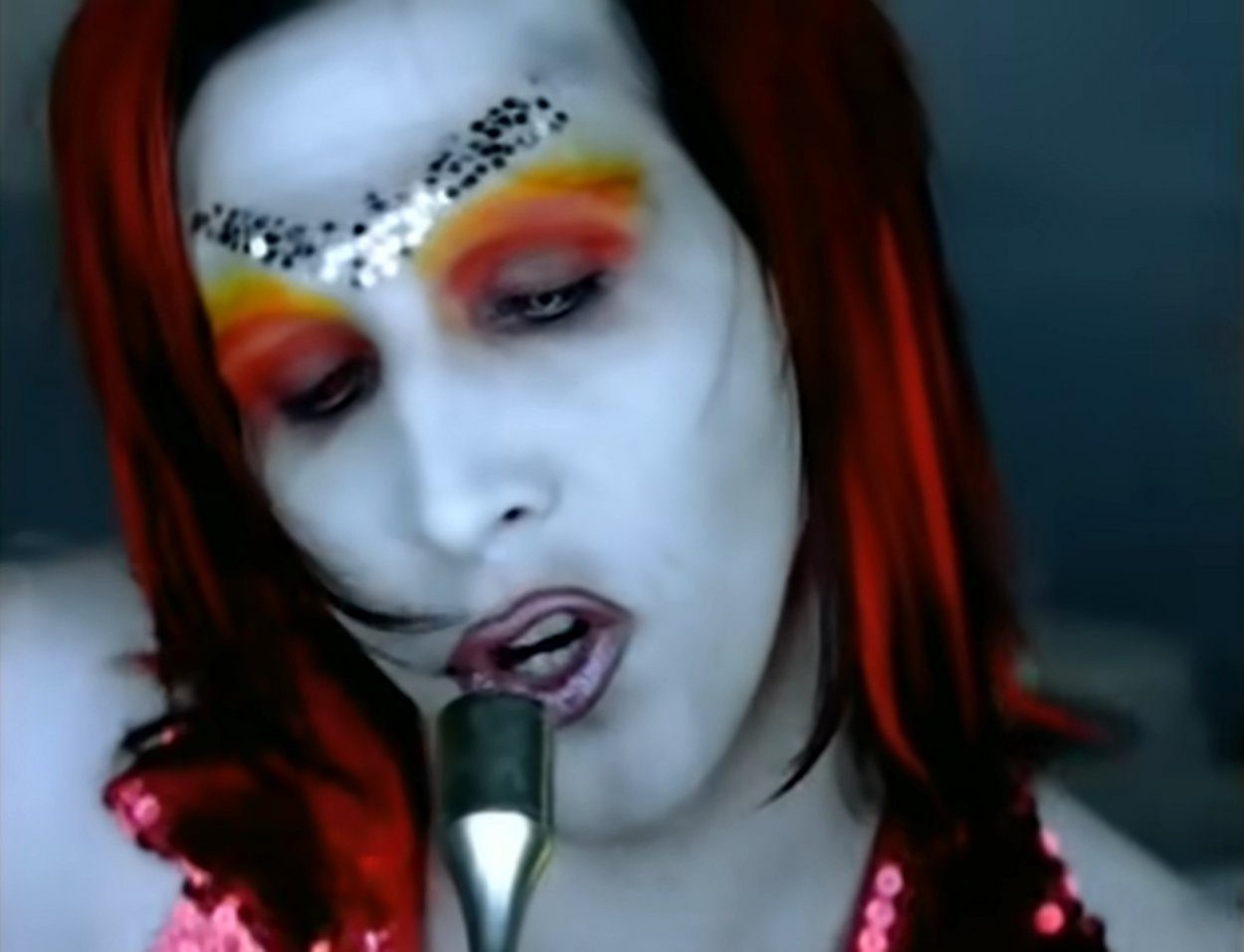
The song’s utterly enchanting, subtle, and surprising melodies build into the chorus:
I am never gonna be the one for you
I am never gonna save the world from you
This is the acceptance that you’re never going to live up to someone else’s unrealistic standards. You’re never going to be what they want, and you’re never going to stop people like them from imposing their views on the world—from making other people feel worthless. But you’re not worthless. “Mechanical Animals” is an anthem of self-acceptance, of acknowledging that you only have to live up to your own standards, not anyone else’s.
They’ll never be good to you
Or bad to you
They’ll never be anything
Anything at all
The song continues with a reminder that those who judge you, who refuse to try to understand, are never going to be a force of good in your life—so why let them be a negative force in it? They aren’t important. Their opinions don’t matter.
Around 02:57 is my favorite drum part of any song, capturing the sheer joy and uplifting quality of “Mechanical Animals.” Whenever I hear this song, it helps me to accept my flaws and my mistakes, to let go of other people’s opinions and judgements, and to regain a sense of purpose. It restores the belief that I’m a good person, that I’m worthwhile, and that I can make a positive difference in the world.
If I’ve been in a dark place, then after listening to these first three songs I’m usually doing a hell of a lot better, but the rest of the album is fantastic too.
04. Rock is Dead
“Rock is Dead” is a tirade against conformity. It argues that people are subdued and placated into conformity by religion, drugs, TV, and even modern rock music. It’s undeniable that rock will never be quite as groundbreaking or original as it was in its early days. Besides this, many fans strive to emulate their idol’s style and attitude rather than cultivating their own. Through his lyrics, Marilyn Manson has always encouraged his fans to find their own way rather than copying him, and to question everything, including what he says, but he’s always had plenty of fans determined to copy him anyway.
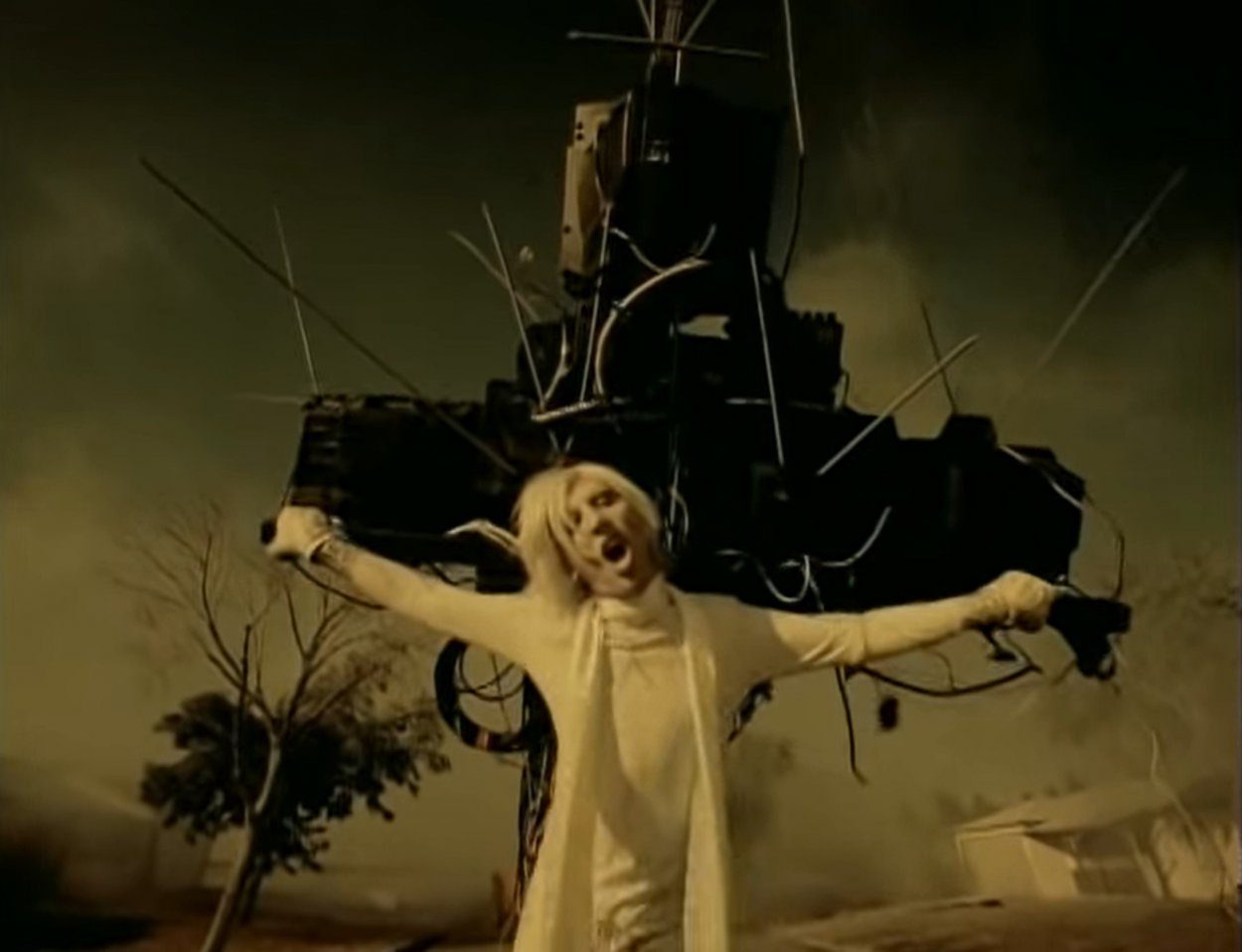
People are understandably scared to be different in a world that often punishes it. Instead of living our lives to the fullest, we find distractions and use them to suppress our true feelings and desires.
You sell all the living
For more safer dead
Manson alludes to the idea that Christianity encourages its members to forgo the things they want in this life, in order to be rewarded when they’re dead. Religious folks aren’t the only ones refusing to live their lives to the fullest. Many more of us waste our lives on drugs or other forms of escapism, trying to distract ourselves from the flaws, feelings, and thoughts that could lead us to be ostracized. As the song says, “Anything to belong.”
05. Disassociative
“Rock is Dead” is followed by two absolutely gorgeous slower-paced songs. “Disassociative” expands on the idea that many of us search for an escape when we can no longer handle the stress and pain of our real life. There’s a duality to the song, as it acknowledges that this escape is necessary, while also warning of the dangers of letting our lives simply slip away.
I can tell you what they say in space
That our Earth is too grey
But when the spirit is so digital
The body acts this way
That world was killing me
World was killing me
Disassociative
The outer space motif crops up again, but here it represents our escape—the digital entertainment that we lose ourselves in. It’s whatever we turn to when we need to get away from the toxicity of our real circumstances. It’s essential. It’s the disassociation that protects us from trauma. However, it can also become dysfunctional. The Earth is grey because we’re no longer living on it—our bodies are there, simply surviving day to day in a grey drudgery. But our consciousnesses have become trapped in space.
I can never get out of here
I don’t want to just float in fear
Dead astronaut in space
Like the dead astronaut, we’re not living anymore. We’re letting life slip away, because we’re afraid. However, also like the astronaut, we know that we don’t want to keep giving in to our fear. We want to find the strength to get back to Earth, and to make the most of our time there. The song doesn’t offer any easy solutions, but it elegantly articulates something that many of us can relate to.
06. The Speed of Pain
“The Speed of Pain” is possibly the closest thing to a love song that Manson has written. It takes me back to a time of teenage unrequited love, when I first listened to it. The song digs in to the bittersweet nature of that feeling, so strong that it seems like it’ll never leave you.
Just remember, when you think you’re free
The crack inside your f*cking heart is me
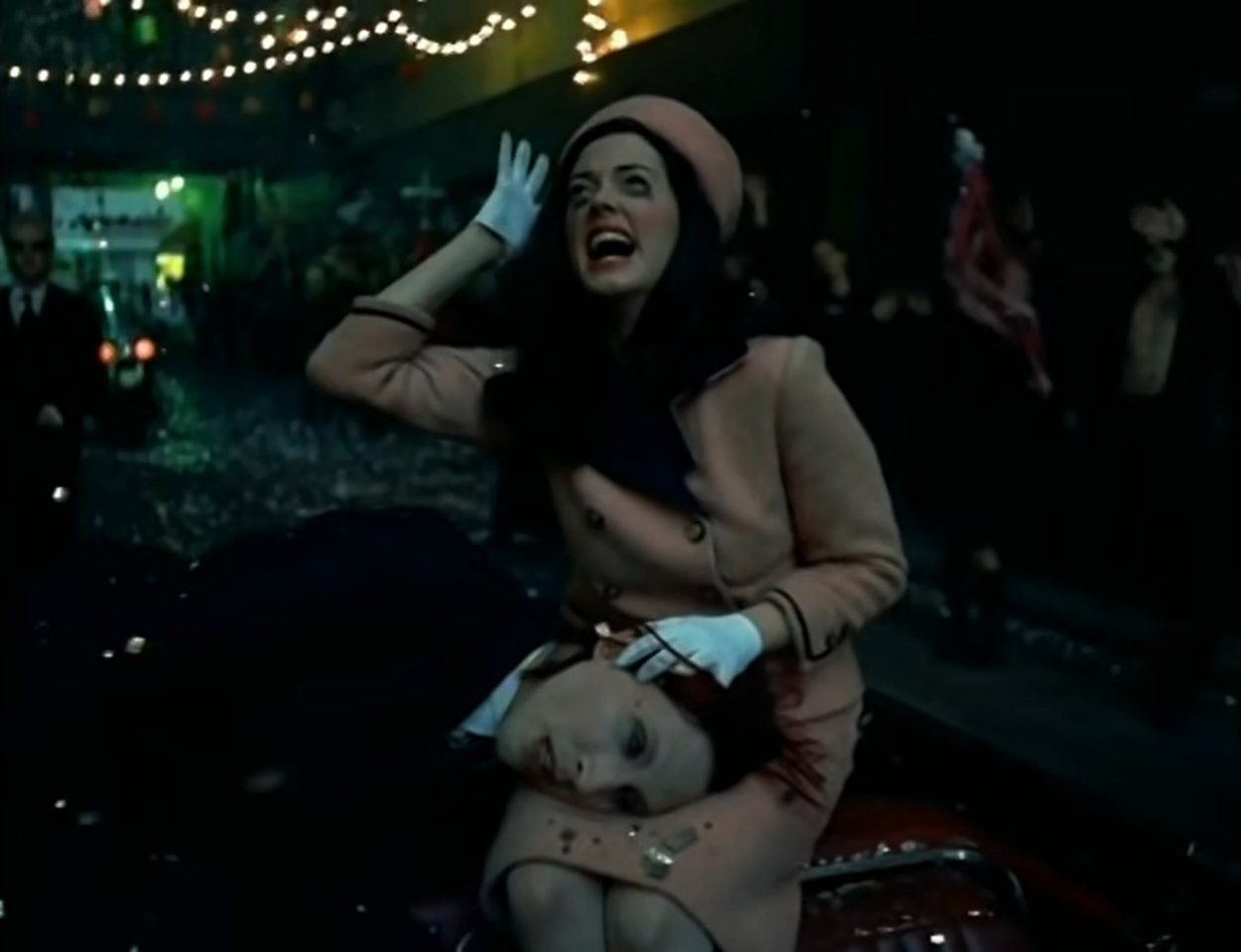
The music echoes this ambivalence, sad yet hauntingly beautiful. The main refrain impeccably illustrates the concept of trying to move on from heartbreak: “I wanna outrace the speed of pain for another day.” This doesn’t only apply to romantic heartbreak, but any painful experience you’re trying to move past. Sometimes trying to outrace the speed of pain really is all you can do, taking it day by day and distracting yourself with something else. Eventually your life regains meaning and the pain fades into the distance.
07. Posthuman
The next song, “Posthuman,” is much faster-paced, and contains the terrific line, “God is a number you cannot count to,” the best metaphor I’ve ever encountered for the nonsensical nature of religious belief.
The catchy tune slows down a little towards the end for vocals by Rose McGowan, Marilyn Manson’s girlfriend at the time the album was made. She repeats the line, “All that glitters is cold,” three times, before the song builds up again into a crescendo. This take on the well-known proverb suggests that even if the thing that glitters is exactly what it appears to be, it will still leave you cold.
This circles back to the concept in “Great Big White World” that when you finally get what you want, you’ll only be disappointed when you realize that it can’t save you or make you happy. It also links back to the elusive nature of God referred to earlier in the song—you can put your faith in religion, or anything else, but you won’t find salvation until you learn to save yourself.
08. I Want To Disappear
“I Want To Disappear” is a discordant diatribe on being disillusioned, mistreated, and misunderstood. The repetition of the phrase “Look at me now” gives a sense of never being truly seen, as emphasized by the lyrics, “I’m a million different things / And not one you know.” It’s not one of my favorite tracks on the album, and it’s not one I tend to give too much thought to, but it’s still a solid song, and relatable when you’re feeling misunderstood.
09. I Don’t Like the Drugs (But the Drugs Like Me)
Next is “I Don’t Like the Drugs (But the Drugs Like Me),” which will have you singing along to its addictive tune and big beats. The lyrics expand on the idea that many of us turn to drugs, religion, or television to escape the harsh realities we face. We don’t want to do this—we want to live our lives to the fullest. We just don’t have the tools to navigate reality. This might be due to the fact that so many of us grow up being pressured to submit to the will of higher authorities, rather than trusting ourselves. We get lost in anxiety and depression when we’re faced with anything that actually challenges us.
You and I are underdosed and we’re ready to fall
We’re raised to be stupid, taught to be nothing at all
This is a fantastic song, and like “Disassociative,” it elucidates how hard it can be to change things—even when we want to—and how frustrating this can be. It’s a reminder to go easy on yourself when you feel like you’re messing up your life, and to know that you’re not alone. There are many more factors at play here than just willpower.
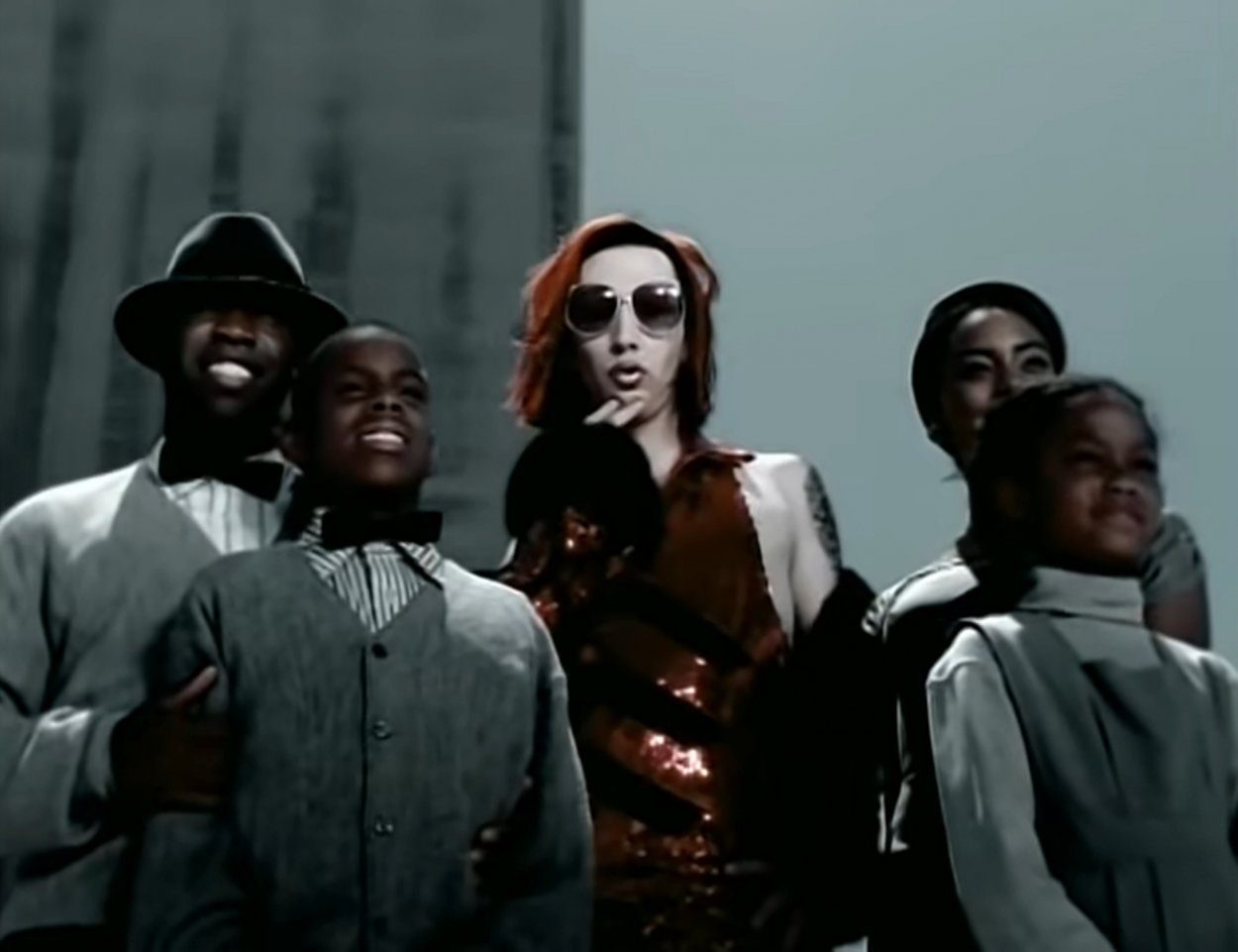
10. New Model No. 15
Like “Mechanical Animals,” “New Model No. 15” expands on the idea that when people give in to the pressure to live up to an ideal standard, they lose their humanity and individuality. The relentlessly upbeat song takes the idea to extremes, describing a robot-like “new model” who is “Better in the head and in bed / At the office,” giving up their autonomy in order to be exactly what other people want.
I can choke and diet on Coke
I’m spun and I know
That I’m stoned and rolling
Lifelike and poseable
Hopeless and disposable
The song describes an existence that is entirely fake, uninteresting, and devoid of substance—one molded by the desire to conform.
As a side note, the number 15, used in the title of this song, crops up throughout Manson’s work—including on the cover of Mechanical Animals, where the band name is written as “MAR1LYN MAN5ON,” with a “1” and a “5” replacing the “I” and the “S.” Marilyn Manson’s birthday is January 5, or 1/5, and he even wrote a song called “15,” with lyrics referencing his birthday, that appears on the album The High End of Low.
11. User Friendly
“User Friendly” employs fairly simple lyrics over an uproariously catchy tune to illuminate the loneliness inherent in searching for a connection, but then settling for what you can get.
I’m not in love, but I’m gonna f*ck you
Til somebody better comes along
The harsh reality that humans constantly hurt each other in the pursuit of sex is acknowledged, as is the fact that isolation can drive us to extremes.
Use me like I was a whore
Relationships are such a bore
Delete the ones that you’ve f*cked
It’s another bittersweet song, filled with disillusionment. At its core there is a longing to get something more out of relationships, but also a resignation to the fact that it never seems to work out that way. Many of us can relate to the loneliness and complexity involved in navigating relationships and how messy they can get.
12. Fundamentally Loathsome
“Fundamentally Loathsome” talks about being jealous of someone else’s happiness, while also assuming that their happiness is fake, as opposed to pain, which lets you know that what you’re feeling is real. It links back to the idea that suffering is part of what make us human, and it suggests that without that darkness, we can’t truly appreciate happiness. The lyrics deal with the desire to be free from depression. They also acknowledge that intense emotions make life worth living in the first place, and that this must necessarily include great sadness.
The song’s final refrain, “Shoot myself to love you / If I loved myself I’d be shooting you,” expands on this, implying that the pain of heartbreak is the price that’s willingly being paid to feel love. However, the lyrics are ambiguous about whether it’s really worth it. The music is fairly slow and calm until the end of the song, when it spirals into a much more intense crescendo to mirror the emotions of the lyrics.
13. The Last Day On Earth
The last two songs on the album are, without a doubt, two of the most beautiful songs I’ve ever heard. Musically, “The Last Day On Earth” is soft and soothing (especially compared to most other Marilyn Manson songs), while retaining that otherworldly quality that the whole album has. The following lyrics provide a concise and bittersweet description of humanity:
And the dogs slaughter each other softly
Love burns its casualties
We are damaged provider modules
We spill the seeds at our children’s feet
This sums up all the damage that we inevitably do to each other, through fighting, love, and dysfunctional parenting, but there’s also a sense of beauty in these lyrics. It’s that same duality that runs through the whole album—the idea that suffering is difficult, but that it’s also an integral part of humanity. There’s a certain peace and acceptance in that sentiment. It’s a refusal to let our problems destroy us, a refusal to give up.
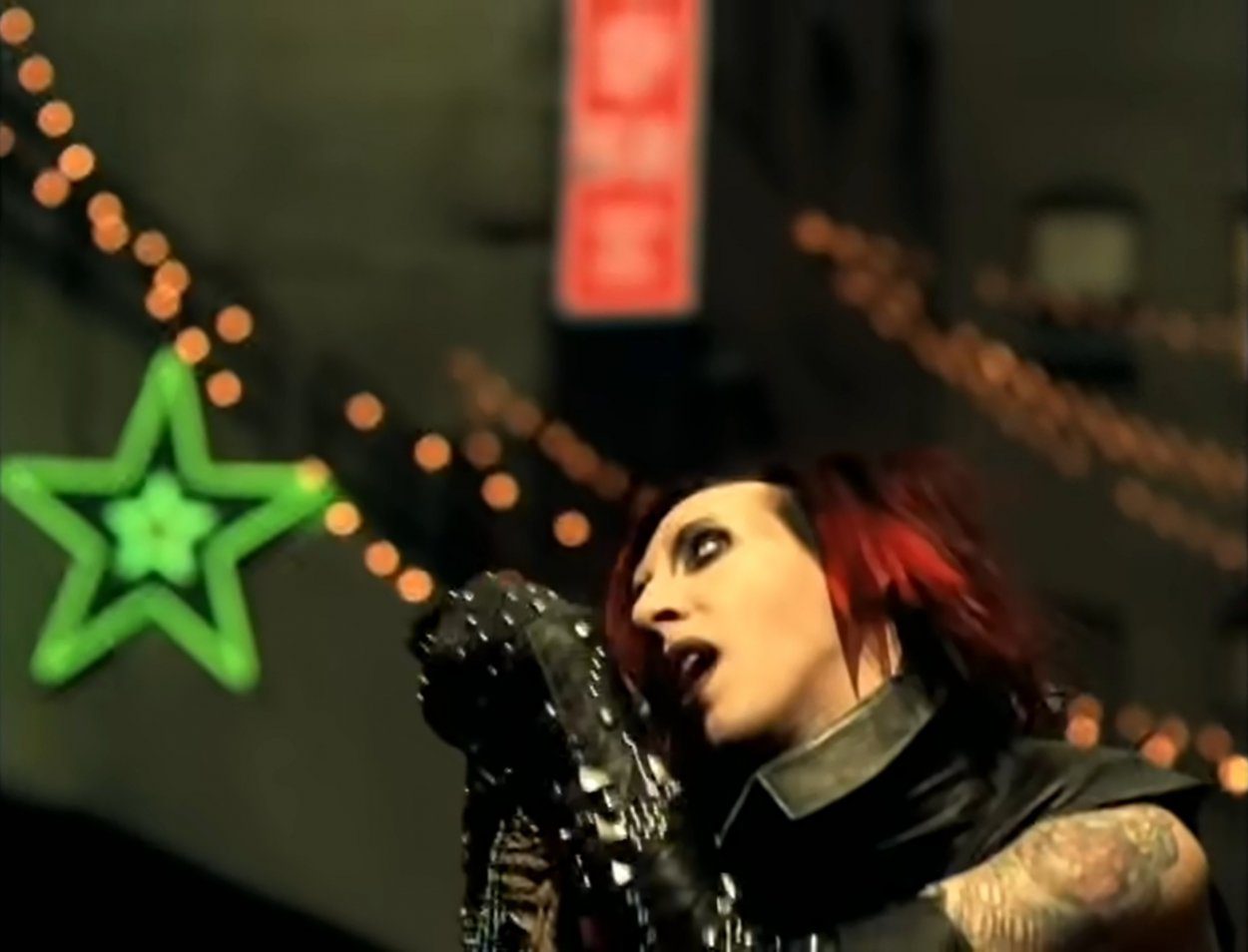
I know it’s the last day on Earth
We’ll be together while the planet dies
I know it’s the last day on Earth
We’ll never say goodbye
Part of the reason this album helps me so much is because it lets me know that I’m not alone. Knowing that someone else struggled with the same things that I’m struggling with, that someone else understands, and that he managed to create this incredible work of art is both reassuring and inspiring. It gives me hope that I can follow Marilyn Manson’s example and one day create something wonderful, despite my own difficulties.
14. Coma White
Another absolutely gorgeous song, “Coma White” is about someone who’s been rejected and tries to run away from that feeling of rejection.
You were from a perfect world
A world that threw me away today
Today
Today
To run away
It circles back to the themes of “Great Big White World.” Just like going into space only to find that the stars are no closer, “Coma White” describes being thrown away by what is perceived as a perfect world. You find people who you’re convinced will finally accept you, only to realize that you don’t fit in with them after all.
A pill to make you numb
A pill to make you dumb
A pill to make you anybody else
But all the drugs in this world
Won’t save her from herself
This song connects to other songs too, like “Disassociative” and “I Don’t Like the Drugs (But the Drugs Like Me).” It describes the desire to escape rejection through drugs, whether literal or metaphorical. You want to be too numb to feel the pain, too dumb to comprehend it, or to be a different type of person altogether, one who doesn’t get rejected. In other words, you want to become someone who doesn’t feel too deeply, who doesn’t think too deeply, and who isn’t flawed—you want to become one of those perfect mechanical animals.
“Coma White” goes on to point out that none of these attempts to escape will save you from yourself. This could come across as depressing, but I find it reassuring. You can’t be saved from yourself by running away, because when you come back, your true self will still be there. You can’t destroy yourself. You can’t permanently make yourself numb, or dumb, or into a different person. In the end, your self-worth is not wrapped up in what other people think of you, what struggles you face, or what you do to try to escape. It’s something in your core. It survives. I often feel like “perfect” people have thrown me away, but when I listen to this song, I remember that they don’t know or determine my worth.
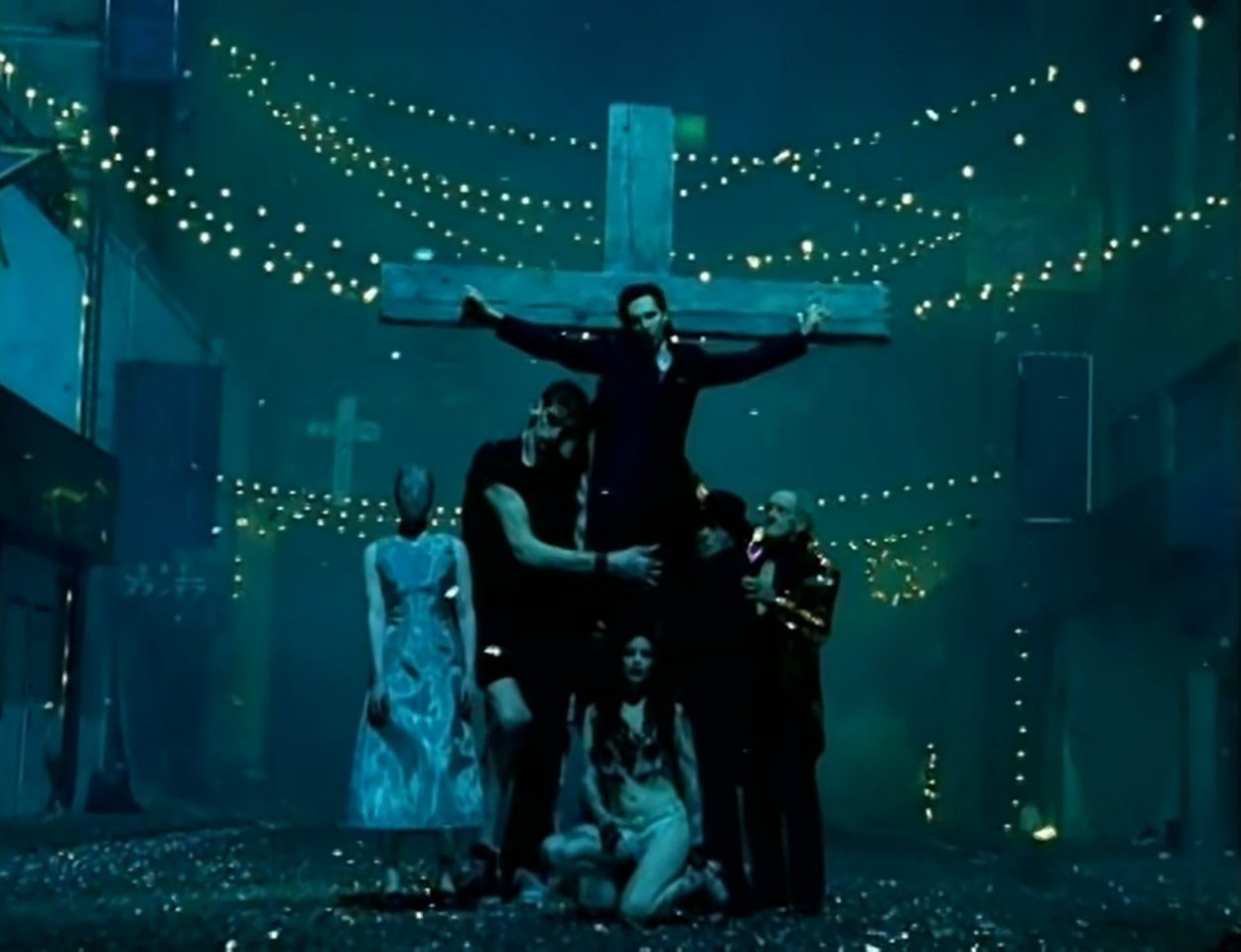
Often, when I listen to Mechanical Animals—especially when I’m feeling particularly down—by the time I reach “The Last Day on Earth” and “Coma White,” I’m so reassured that I start to fall asleep. Having processed, dealt with, and let go of all my troubles, the soothing sounds of “Coma White” make me feel completely at peace, safe, and comforted, and it acts as a lullaby. The album has become part of who I am to such an extent that when I listen to it, I feel at home, and that all is right with the world.
Part of it is also the fact that the music is so wonderful and complex. It allows me to empty my mind of all distracting trains of thought, because my attention is 100% occupied focusing on the intricate strands of melody effortlessly weaving in and out.
I hope that if you haven’t heard it, you’ll give Mechanical Animals a listen. The power of truly great music really can’t be overstated. Which albums have affected you like this? What is your top album of all time, and why? Let us know in the comments.


Thrilled to see such a recent review of this. This is my favorite album of all time. I’ve never taken as much time as you have to go through the lyrics like this. Loved all your interpretations and they sound spot-on. I like the album more now! Great job. Was interesting to hear how a female interprets some of the lyrics too. You have a much more positive spin on this album than I, which was maybe the most refreshing part of this.
“the soothing sounds of ‘Coma White'” XD
I bet this album is very queer-friendly. I’m bisexual. There’s nothing overtly queer, aside from everything Manson wears. But, being queer makes you feel like an alien.
Amazing review! Very well in depth analysis
Wow this is a very deep and complete review of this Amazing album by Marilyn Manson. You really do have a special way of putting emotions Into words that I wish I had.
Wanted to point out something about the colored case that you may not have known. Throughout the sonic booklet there are a variety of “hidden” messages or ones to be decoded. These particular words or graphics are printed in the color yellow and are harder to see printed at first glance. When you view each page through the blue plastic, you’ll be able to view and read these much more clearly. As you probably know: blue + yellow = green. It’s kinda like an invisible ink trick, or like a colored magnifying glass that’s doesn’t make it larger but more so highlights the hidden parts. I think it’s a great little addition to already astonishing sinus packaging. I always though it was cool how it seems to play with perception and of course an homage to backmasking (in the golden age of hard rock and early metal when parents thought there were hidden messages in the albums if kids played them backwards). Anyway, thought you’d find this interesting if you hadn’t already known about it.